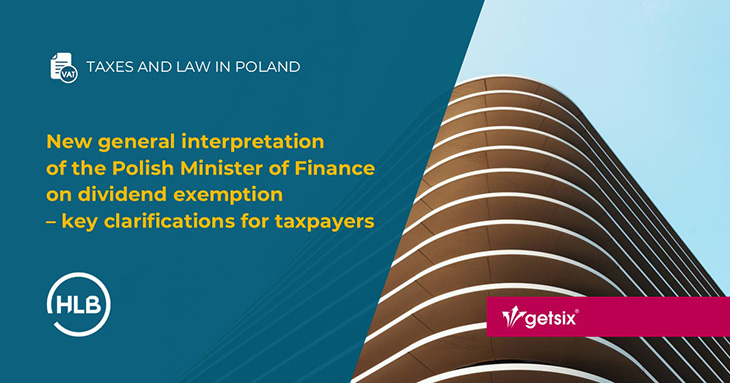New general interpretation of the Polish Minister of Finance on dividend exemption – key clarifications for taxpayers
On November 20, 2024, the Polish Minister of Finance published General Interpretation No. DD9.8202.1.2024, dated November 15, 2024, regarding the conditions for applying the exemption specified in Article 22(4) of the Polish Corporate Income Tax (CIT) Act.
This interpretation is intended to clarify doubts related to the condition of “not benefiting from the exemption from taxation on its entire income – regardless of the source of its earning.”
Dividend exemption in the Polish CIT Act
According to Article 22(4) of the Polish CIT Act, dividends paid by Polish companies to entities from other European Union (EU) or European Economic Area (EEA) member states may benefit from exemption from taxation in Poland, provided that specific criteria are met. One of these is the requirement that the recipient of the dividend does not use the exemption from taxation of its entire income, regardless of its source.
The core of the issue
Council Directive 90/435/EEC of July 23, 1990, on the common system of taxation applicable to parent companies and subsidiaries of different member states (the Parent-Subsidiary Directive – PS Directive) indicates two alternative mechanisms to eliminate multiple taxation of transferred profits (dividends).
The first mechanism, adopted in the Polish CIT Act, provides for:
- exemption from taxation of transferred profits (dividends) in the country of tax residence of the subsidiary transferring (distributing) such profits to the parent company, and
- exemption from taxation of transferred profits (dividends) in the country of tax residence of the parent company (receiving the dividend).
Thus, the SP Directive itself already assumes that a part of the profits of the company receiving the dividend (the dividend received) may be exempt from taxation, which raised doubts as to whether, in such a case, the condition of exemption of the dividend from taxation in the country of tax residence of the company paying the dividend remains fulfilled, which boils down to the fact that the recipient of the dividend does not benefit from exemption from taxation of its entire income, regardless of the source of its income.
Position of the Polish Minister of Finance
In a general interpretation, the Minister of Finance clarified that the fact that a recipient of dividends from another EU or EEA Member State benefits from a tax exemption of an objective nature on the basis of the provisions implementing the PS Directive into national legislation does not violate the aforementioned condition. This means that such an exemption is not considered an exemption from taxation on all of the recipient’s income.
Profit transfer and the Beneficial Owner
The Minister of Finance also stated that the following circumstances do not indicate that a taxpayer benefits from an exemption from taxation on its entire income within the meaning of Article 22(4)(4) of the Polish CIT Act:
- the transfer of profits in a chain of entities in such a way that the dividend is not taxed at least once within the EU or EEA, when its beneficial owner is a company established for tax purposes outside the EU and EEA or an entity that does not meet the definition of a company within the meaning of the PS Directive.
- the lack of payment of income tax by the taxpayer in a given tax year due to its individual circumstances (e.g., settlement of a tax loss or obtaining income only from dividends).
However, the Polish tax authority explicitly stated that such cases may be subject to an assessment whether, in accordance with Article 22c of the CIT Act, they should not be qualified as an abuse of tax exemptions.
Importance of the Interpretation
The published general interpretation provides important guidance for taxpayers and tax advisors regarding the application of dividend exemptions. It clarifies that the use of the objective exemptions resulting from the implementation of the PS Directive does not violate the condition not to use the exemption on the entire income.
At the same time, it emphasizes the need to analyze cases where transaction structures may lead to tax avoidance, in the context of anti-abuse regulations.
Taxpayers should pay particular attention to these guidelines when planning cross-border transactions to ensure compliance with applicable regulations and avoid potential disputes with the Polish tax authorities.
If you have any questions regarding the application of the dividend exemption in Poland or require support in optimizing your tax settlements, we encourage you to contact our experts. We will be happy to help analyse your situation and provide comprehensive advice tailored to your individual needs.
 Source: This article was prepared by Tomasz – Senior Tax Consultant at getsix® Tax & Legal
Source: This article was prepared by Tomasz – Senior Tax Consultant at getsix® Tax & Legal
If you have any questions regarding this topic or if you are in need for any additional information – please do not hesitate to contact us:
CUSTOMER RELATIONSHIPS DEPARTMENT

ELŻBIETA
NARON-GROCHALSKA
Head of Customer Relationships
Department / Senior Manager
getsix® Group
***














